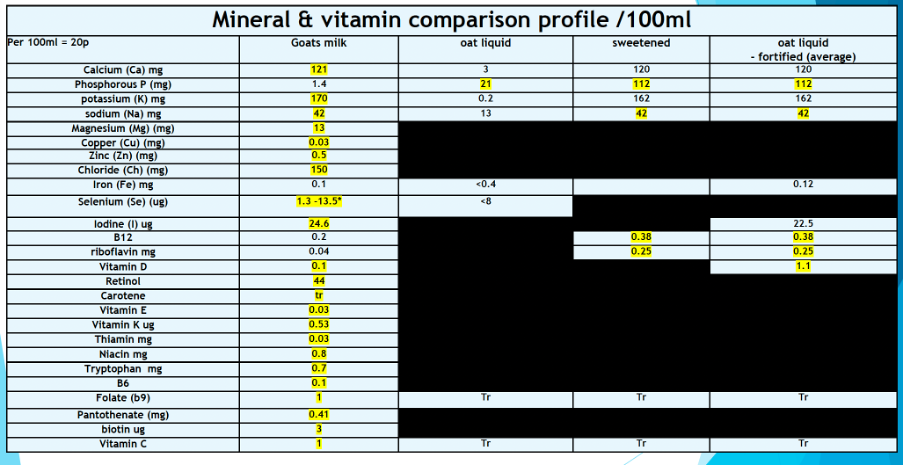According to research commissioned by the Milking Goat Association (MGA), consumers looking to make changes to their daily diet to get healthier post the festive binge should swap to using goat’s milk rather than plant-based milks. By doing this, consumers, pound for pound, will get more nutrients and minerals into their daily diets.
In the research, carried out by Bic-Innovation, goat’s milk was compared to leading oat liquid milk alternatives and other plant based milk alternatives and the differences were considerable. It found that £0.20 of goat’s milk had higher protein and essential amino acids, energy, fat, potassium, vitamin (B6, B12, C, D and E) and zinc compared to £0.20 of dairy alternative drinks. *(Please see table 1 for reference).
Gary Yeomans, chairman of the MGA, says: “The findings of the research were really very interesting. Effectively, as a consumer if you adopt drinking plant-based milk alternatives over dairy milk (cows’, goats’ and other animal milks) you won’t get as many nutrients and you’ll have to spend money on other food products to ensure you get the right nutrients in your diet. With the ‘cost of living’ on many consumers’ minds it makes sense to use goats’ milk.
The other factor to consider is the long-term effect of using plant-based milks rather than dairy milks. If choosing plant-based milks and not watching their daily nutrient intake, consumers could create deficiencies in key minerals they need in their diets. For example, goats’ milk and goats’ milk products are a good source of iodine, which the body needs for growth, the metabolism, neurological function and thyroid hormone regulation.
Our advice is that If you want to make one positive change to your diet in the New Year, then incorporate goats’ milk or goats’ milk products into your daily diet. They are readily available in leading supermarkets and food shops.”
Many plant-based milks are also ultra-processed foods, not natural foods. This means that they often have stabilisers and other chemicals added to them. Some oat-based milk alternatives have Dipotassium Phosphate added to them which acts as an acidity regulator. Side effects of long-term ingestion of Dipotassium Phosphate include headaches and gut irritation. What is there in goat’s milk? Just milk.
Finally, most of these plant-based drinks are characterised by a lower bioavailability of minerals and vitamins than milk, mainly due to the presence of antinutrient compounds, but also due to the fact that they are not fully dissolved in the water leaving sedimentation in the bottom, so if not shaken before use, then very little of the vitamins and minerals are ingested.

